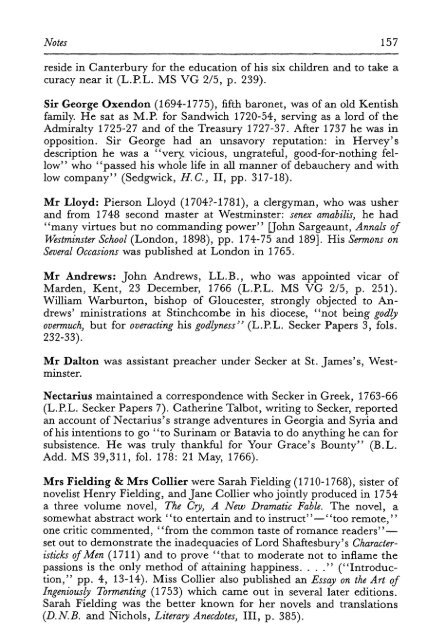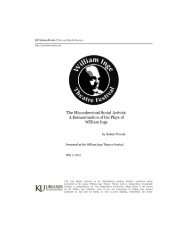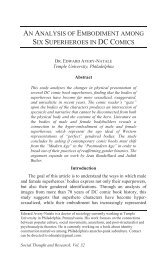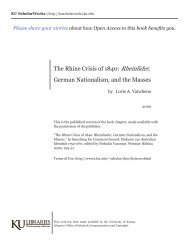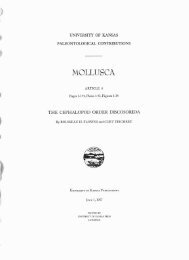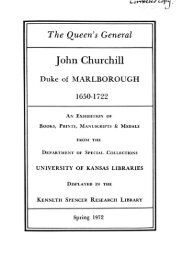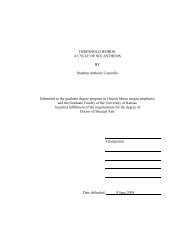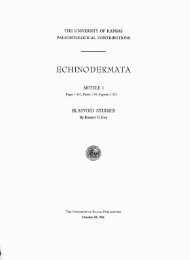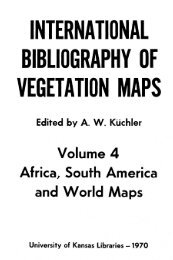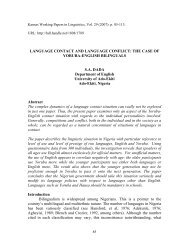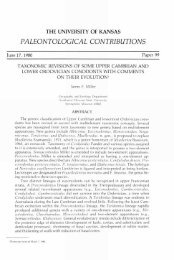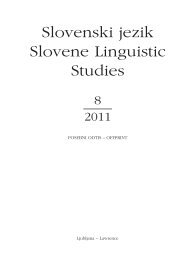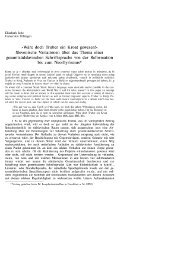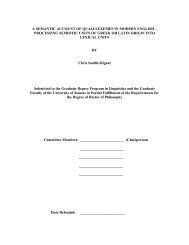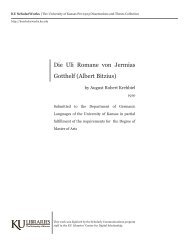Archbishop of Canterbury - KU ScholarWorks - The University of ...
Archbishop of Canterbury - KU ScholarWorks - The University of ...
Archbishop of Canterbury - KU ScholarWorks - The University of ...
You also want an ePaper? Increase the reach of your titles
YUMPU automatically turns print PDFs into web optimized ePapers that Google loves.
Notes 157<br />
reside in <strong>Canterbury</strong> for the education <strong>of</strong> his six children and to take a<br />
curacy near it (L.P.L. MS VG 2/5, p. 239).<br />
Sir George Oxendon (1694-1775), fifth baronet, was <strong>of</strong> an old Kentish<br />
family. He sat as M.P. for Sandwich 1720-54, serving as a lord <strong>of</strong> the<br />
Admiralty 1725-27 and <strong>of</strong> the Treasury 1727-37. After 1737 he was in<br />
opposition. Sir George had an unsavory reputation: in Hervey's<br />
description he was a "very vicious, ungrateful, good-for-nothing fellow"<br />
who "passed his whole life in all manner <strong>of</strong> debauchery and with<br />
low company" (Sedgwick, H.C, II, pp. 317-18).<br />
Mr Lloyd: Pierson Lloyd (1704P-1781), a clergyman, who was usher<br />
and from 1748 second master at Westminster: senex amabilis, he had<br />
"many virtues but no commanding power" [John Sargeaunt, Annals <strong>of</strong><br />
Westminster School (London, 1898), pp. 174-75 and 189]. His Sermons on<br />
Several Occasions was published at London in 1765.<br />
Mr Andrews: John Andrews, LL.B., who was appointed vicar <strong>of</strong><br />
Marden, Kent, 23 December, 1766 (L.P.L. MS VG 2/5, p. 251).<br />
William Warburton, bishop <strong>of</strong> Gloucester, strongly objected to Andrews'<br />
ministrations at Stinchcombe in his diocese, "not being godly<br />
overmuch, but for overacting his godlyness" (L.P.L. Seeker Papers 3, fols.<br />
232-33).<br />
Mr Dalton was assistant preacher under Seeker at St. James's, Westminster.<br />
Nectarius maintained a correspondence with Seeker in Greek, 1763-66<br />
(L.P.L. Seeker Papers 7). Catherine Talbot, writing to Seeker, reported<br />
an account <strong>of</strong> Nectarius's strange adventures in Georgia and Syria and<br />
<strong>of</strong> his intentions to go "to Surinam or Batavia to do anything he can for<br />
subsistence. He was truly thankful for Your Grace's Bounty" (B.L.<br />
Add. MS 39,311, fol. 178: 21 May, 1766).<br />
Mrs Fielding & Mrs Collier were Sarah Fielding (1710-1768), sister <strong>of</strong><br />
novelist Henry Fielding, and Jane Collier who jointly produced in 1754<br />
a three volume novel, <strong>The</strong> Cry, A New Dramatic Fable. <strong>The</strong> novel, a<br />
somewhat abstract work "to entertain and to instruct" — "too remote,"<br />
one critic commented, "from the common taste <strong>of</strong> romance readers" —<br />
set out to demonstrate the inadequacies <strong>of</strong> Lord Shaftesbury's Characteristicks<br />
<strong>of</strong> Men (1711) and to prove "that to moderate not to inflame the<br />
passions is the only method <strong>of</strong> attaining happiness. ..." ("Introduction,"<br />
pp. 4, 13-14). Miss Collier also published an Essay on the Art <strong>of</strong><br />
Ingeniously Tormenting (1753) which came out in several later editions.<br />
Sarah Fielding was the better known for her novels and translations<br />
(D.N.B, and Nichols, Literary Anecdotes, III, p. 385).


